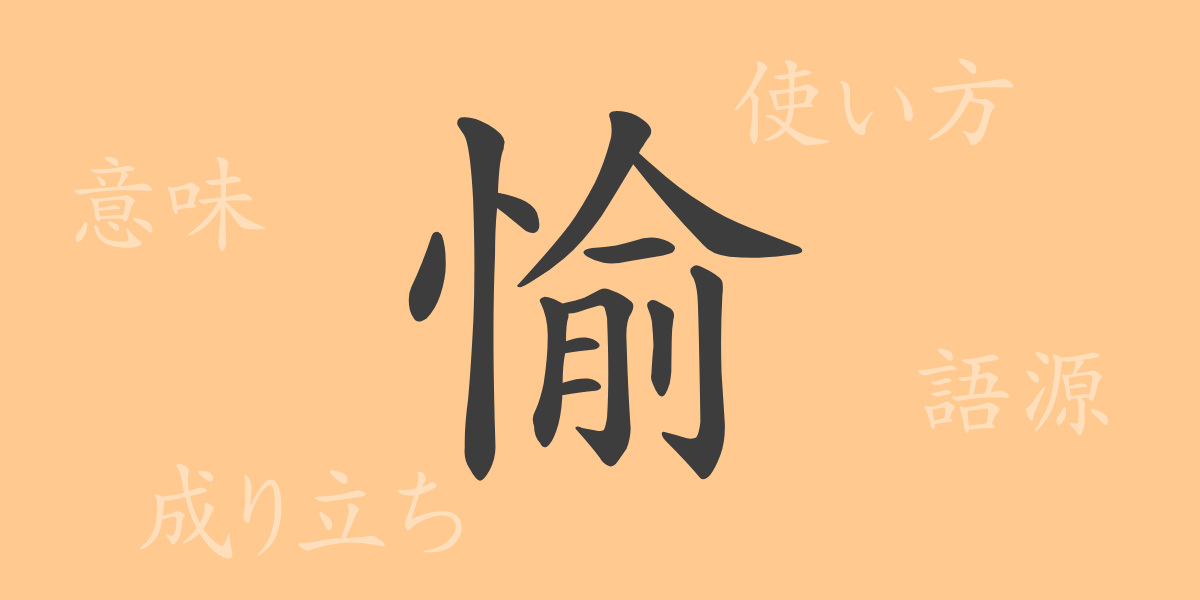Characters are the crystallization of culture and history. The 常用漢字(じょうようかんじ, Jōyō Kanji) “愉(ゆ, yu)” is one of the essential characters for expressing nuances of emotions in daily life. This article delves into the charm of “愉(ゆ, yu)” from its etymology to its meaning, usage, pronunciation, as well as idioms and proverbs containing it. For those seeking a deeper understanding of the Japanese language, the world of “愉(ゆ, yu)” will surely bring new discoveries and joy.
Etymology of 愉(ゆ, yu)
The kanji “愉(ゆ, yu)” has evolved from ancient Chinese pictograms. Originally, it depicted the act of catching fish and feeling joy, combining the character for “fish” with the phonetic component “兪(ゆ, yu).” Over time, “愉(ゆ, yu)” came to mean enjoyment and joy, leading to its current usage.
Meaning and Usage of 愉(ゆ, yu)
“愉(ゆ, yu)” is used to express feelings of joy, happiness, and pleasure. It is often used to convey genuine enjoyment and satisfaction, typically in positive contexts. For example, expressions like “愉快(ゆかい, yukai)な一日を過ごす (to have a pleasant day)” and “愉悦(ゆえつ, yuetsu)に浸る (to immerse in joy)” are common.
Pronunciation, Stroke Count, and Radical of 愉(ゆ, yu)
Let’s take a closer look at the pronunciation and structure of the kanji “愉(ゆ, yu).”
- Pronunciation: In 音読み(おんよみ, onyomi), it is read as “ユ(ゆ, yu),” and in 訓読み(くんよみ, kunyomi), it is read as “たの.しい (tano.shii)” or “たの.しむ (tano.shimu).”
- Stroke Count: “愉(ゆ, yu)” has 12 strokes.
- Radical: The radical is “心(こころ, kokoro)” (or “忄(りっしんべん, risshinben)”), common to characters expressing emotions.
Idioms, Proverbs, and Phrases Containing 愉(ゆ, yu)
Idioms, proverbs, and phrases containing “愉(ゆ, yu)” enrich the Japanese language with expressive depth. Here are a few examples:
- 愉快犯(ゆかいはん, yukaihan): A person who commits a crime purely for enjoyment.
- 愉悦(ゆえつ, yuetsu): Genuine enjoyment or deep joy.
- 愉悦郷(ゆえつきょう, yuetsukyō): A place overflowing with joy and happiness.
- 愉楽(ゆらく, yuraku): Enjoyment or amusement.
Conclusion on 愉(ゆ, yu)
The kanji “愉(ゆ, yu)” has been used to richly express emotions in the daily lives of Japanese people. From its etymology to its modern meaning, usage, and idioms, one can feel the weight of history and culture this character carries. Understanding “愉(ゆ, yu)” is a step towards appreciating the depth of emotional expression in the Japanese language.

























